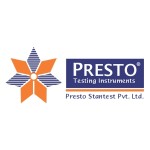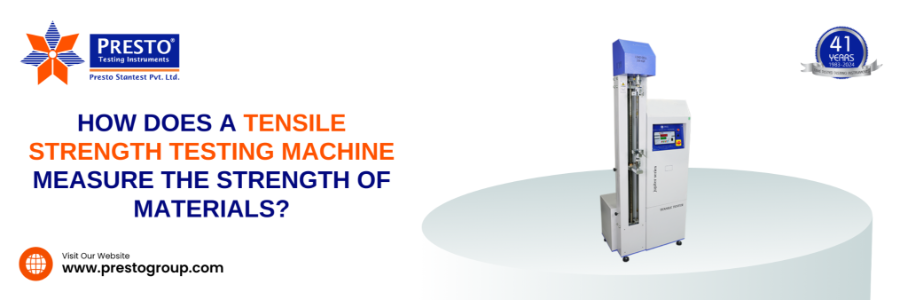Tensile strength testing is a crucial process in quality control and research and development for industries like automotive, construction, packaging, and textiles. It helps determine the strength and durability of materials under tension. To carry out these tests effectively, specialized equipment such as tensile strength testers and tensile test machines are used. In this blog, we’ll explore the importance of tensile testing, how these machines work, pricing considerations, and leading manufacturers.
What is a Tensile Strength Tester?
A tensile strength tester is a device used to measure the tensile strength of a material, which is its resistance to being pulled apart. This type of testing is essential to ensure that materials meet specific performance and safety standards. Tensile strength testers are used to evaluate various properties, such as:
- Maximum load a material can bear.
- Elongation and deformation under stress.
- Breaking point and fracture characteristics.
These insights are crucial for industries like manufacturing, where material performance can directly impact product quality and safety.
How Does a Tensile Test Machine Work?
A tensile test machine operates by clamping the material sample at both ends and applying a controlled tensile force until the sample breaks. The machine records data such as the applied force, elongation, and time, which are used to calculate the material’s tensile strength.
The testing process typically involves:
- Sample Preparation: A material specimen is prepared according to specific dimensions.
- Mounting: The specimen is clamped securely in the machine.
- Testing: The machine applies a tensile force at a controlled rate.
- Data Collection: Key parameters such as force, elongation, and stress are measured.
- Analysis: The results are analyzed to determine the material's tensile strength and other properties.
Modern tensile test machines often include advanced software that provides detailed reports and graphical representations of test results, making analysis easier and more precise.
Tensile Strength Tester Price
The price of a tensile strength tester can vary significantly depending on factors such as capacity, accuracy, and advanced features. Here’s a general breakdown:
- Basic Models: Entry-level tensile testers for small-scale or educational use start at around $1,000 to $5,000.
- Mid-Range Models: Machines for industrial applications with additional features like digital displays or advanced software range between $10,000 and $30,000.
- High-End Models: Precision tensile test machines with extensive automation and high capacity can cost $50,000 or more.
When choosing a machine, consider your specific testing needs, budget, and the availability of after-sales support and maintenance services.
Leading Tensile Strength Tester Manufacturers
To ensure accurate and reliable testing, it’s essential to choose a machine from a reputable manufacturer. Here are some of the top tensile strength tester manufacturers:
- Presto Group: Known for their high-quality testing equipment, Presto Group offers advanced tensile testers suitable for a wide range of applications. Their machines are reliable, durable, and designed to meet international testing standards.
- Instron: A global leader in materials testing equipment, Instron produces premium tensile testers with cutting-edge technology and exceptional accuracy.
- Shimadzu: Renowned for their precision instruments, Shimadzu offers tensile test machines that combine innovative features with robust performance.
- Tinius Olsen: Specializing in materials testing, Tinius Olsen provides tensile testers designed for both research and industrial applications.
- ZwickRoell: A trusted name in materials testing, ZwickRoell produces versatile tensile test machines with advanced control systems.
Applications of Tensile Strength Testers
Tensile strength testers are widely used in various industries to ensure material quality and reliability. Some common applications include:
- Automotive Industry: Testing metals, plastics, and composites used in vehicle components.
- Construction: Evaluating the strength of materials like concrete, steel, and rebar.
- Textiles: Measuring the tensile strength of fabrics, yarns, and fibers.
- Packaging: Assessing the durability of materials like plastic films, paper, and adhesives.
- Aerospace: Ensuring the reliability of high-performance materials used in aircraft and spacecraft.
Choosing the Right Tensile Strength Tester
When selecting a tensile strength tester or machine, consider the following factors:
- Testing Capacity: Ensure the machine can handle the maximum load your materials require.
- Accuracy and Precision: Look for machines with high accuracy and repeatability.
- Advanced Features: Consider features like automation, software integration, and real-time data analysis.
- Standards Compliance: Ensure the machine adheres to international standards such as ASTM, ISO, or DIN.
- After-Sales Support: Choose a manufacturer that offers reliable support, maintenance, and calibration services.
Conclusion
A tensile strength tester is an invaluable tool for evaluating the mechanical properties of materials. Whether you’re in manufacturing, construction, or research, investing in a high-quality tensile test machine is essential for ensuring product performance and safety. By considering the price, features, and manufacturer reputation, you can select the right equipment to meet your testing needs.
With the right tensile strength tester, you can enhance quality control, reduce product failures, and ensure compliance with industry standards, setting your business up for long-term success.






Comments